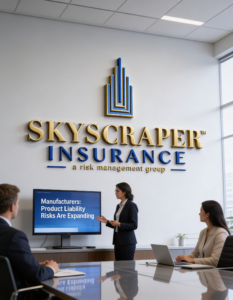Forward-thinking insurers are creating new products to fulfill the evolving needs of commercial-trucking customers.
The need for increased driver and vehicle safety along with technological advancements in logistics and sustainability are driving a major revolution in the trucking business. New trend in trucking fleet management aim to maximize vehicle performance and cut fuel expenses.
At the same time, autonomous trucks and robotization increase delivery possibilities while trucking analytics and invoice management boost operational efficiency and profitability.
Insurance providers are adopting a “digital first” approach in response to the increasing technological adoption. The insurance companies lining up with the latest trucking trends and evolving insurance needs are best-positioned to beat the competition.
What follows is a look at innovative trucking technologies coming on line in 2024-25 as well as the impact these advances are likely to have on commercial truck insurance in the U.S.
How trucking tech be revamped in the year to come
The latest technologies are greatly impacting the future as well as the current situation of the trucking industry. Here’s what trucking businesses can expect in the near future:
- Electric trucks: As the trucking industry is one of the largest contributors to carbon emissions, electric trucks will greatly benefit the environment. It is predicted that most trucks, especially semi trucks, will be manufactured as electric ones.
- Automation: Trucking companies can expect full automation in various operations such as managing truck routes and fleet management. Many trucking businesses are adopting automation in their processes to maximize efficiency and profits.
- Self-driving trucks: Self-driving trucks represent one of the greatest innovations in the trucking industry. Presently, there are no self-driving trucks available due to safety concerns, but they will likely be available soon.
What follows are the top tech trends shaping the insurance industry in 2023. These trends also will impact commercial trucking.
- Generative AI: ChatGPT, Google’s BARD and many other AI tools have revamped countless industries including trucking. Artificial intelligence tools can help to prepare and manage insurance documents faster. This will make the management of digital submissions for truck insurance more effective and hassle-free. For instance, ChatGPT can be used to write insurance plan contracts and improve customer satisfaction. Chatbots also can be used to automatic customer communications.
- Analysis of unstructured data: User information collected from claim notes, social media, multimedia and so forth is considered unstructured data. With the latest trends in the Internet of Technologies (IoT), insurance providers can mine and analyze data to make solid customer profiles.
- Flexibility and scalability: Most insurance companies are using modern tech to drive fast growth. Using modern architecture, insurance businesses can reduce costs, too. Top-rated companies are looking forward to supporting tools that give scalability and flexibility. For example, automating the claim settlement process can reduce the work and time required to complete this task.
- Telematics have impacted many sectors, and the trucking industry is one of them. Why? Many insureds in the commercial insurance space are opting for insurance plans that analyze data from wearable devices and help to choose suitable policies.
- The metaverse technology concept helps to identify risks and handle insurance coverage. Insurance carriers will be required to provide coverage for such transactions as crypto and NFTs. In the metaverse, customers can make payments and receive funds via digital currency.
How will trucking tech impact commercial truck insurance?
Self-driving trucks are reaching the final development stages and are poised to change the industry. Insurance companies are now engaged in the work of developing new products to handle the forthcoming need to protect automatic trucks.
When it comes to premiums, there are several factors at play including rising claims, litigation costs and enhanced regulation. In the United States, the average cost of commercial truck insurance is between $500 to $2,000, depending on the size of the vehicle. Premiums also are rising alongside the number of accidents, according to the American Transport Research Institute. It has reported that the cost of insurance premiums has increased by 47% over the last decade.
On the telematics front, monitoring, converting, and analyzing data about drivers and trucks is becoming more common. Insurance carriers can now identify vehicle drivers who are speeding, driving recklessly braking suddenly and more. With the use of this technology, insurers are better able to assess possible risks and tailor coverage for truck drivers.
Of course, cybersecurity threats are increasing due to a greater reliance on AI tools and other technology to manage policies, claims processing and the like. This remains a significant risk for insurance companies. There remains a significant risk of data breaches, hacking and data theft.
Another pressing issue continues to be the shortage of skilled truck drivers. Insurance providers can assist transportation companies with this matter by working to lure more safe drivers. Trucking companies that such benefits as retirement plans, health insurance and workers’ compensation coverage have the best chances of keeping skilled and experienced drivers on staff and attracting new ones.
Safety also remains a concern. Installing such tools as anti-locking brakes, adaptive cruise control and road-safety warnings are all measures that can help truckers stay safe on the roads while also lower insurance costs.
Digital transfers represent one final issue to keep an eye on. The inconvenience of managing and keeping an eye on currency while paying premiums has been greatly diminished by digital or electronic payments. The insured and the insurer are under less stress; thanks to technology that facilitates the automated processing of insurance claims in a single step.
To summarize, the commercial truck insurance market is adjusting to a shifting environment thanks to the advanced technologies outlined above. Forward-thinking insurance carriers are creating new policies and products to fulfill the evolving needs of commercial-trucking customers and handle hazards both probable and improbable.









